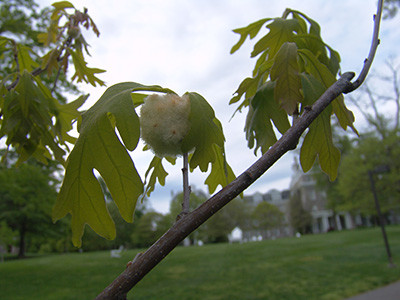
Wool-sower gall
 Some of the newly installed oaks on campus appear to have grown cotton balls with pink spots. These are actually a type of tree gall called Wool-sower gall.
Some of the newly installed oaks on campus appear to have grown cotton balls with pink spots. These are actually a type of tree gall called Wool-sower gall.

This gall is produced by the harmless Cynipid gall wasp (Callirhytis seminator). photo credit: R. Robert
This gall is produced by the harmless Cynipid gall wasp (Callirhytis seminator). These wasps lay their eggs on a specific plant and the eggs produce the grubs whose secretions cause the gall formation. The gall provides protection and nutrition. Their favorite host plants are oaks.
The galls do not harm the tree, so the best integrated pest management practice is to co-exist. One-to three-weeks later a wasp will emerge. It is another amazing insect-plant relationship.





Wendy
Posted at 10:09h, 25 MayHave never seen these before, very interesting, Have to keep our pollinators reproducing! I am really enjoying these posts, so informative, and the plants are beautiful!
Becky Robert
Posted at 08:25h, 30 MayThank you Wendy. There are some really interesting insects out there! I am always amazed how much we still don’t know about the natural world. For instance, I could find little to no info of the adult habits of this creature.
Happy Spring,
Becky Robert
Rose Martin
Posted at 08:46h, 07 JuneI just found a few oak trees that have the wool sower gall. What do I do with them. Do I just leave them be?
Lars Rasmussen
Posted at 11:56h, 09 JuneHi Rose. I would just leave them be. Unless they are all over the trees in high numbers it should not be a problem. They may have hatched out by now.
-Lars Rasmussen
Plant Health Coordinator
Scott Arboretum
Nancy Armstrong
Posted at 10:41h, 29 MayJust discovered a Wool Sower gall on a small oak sapling. I was wondering why the gall is sticky? Also, exactly how does the wasp create such an intricate structure ?